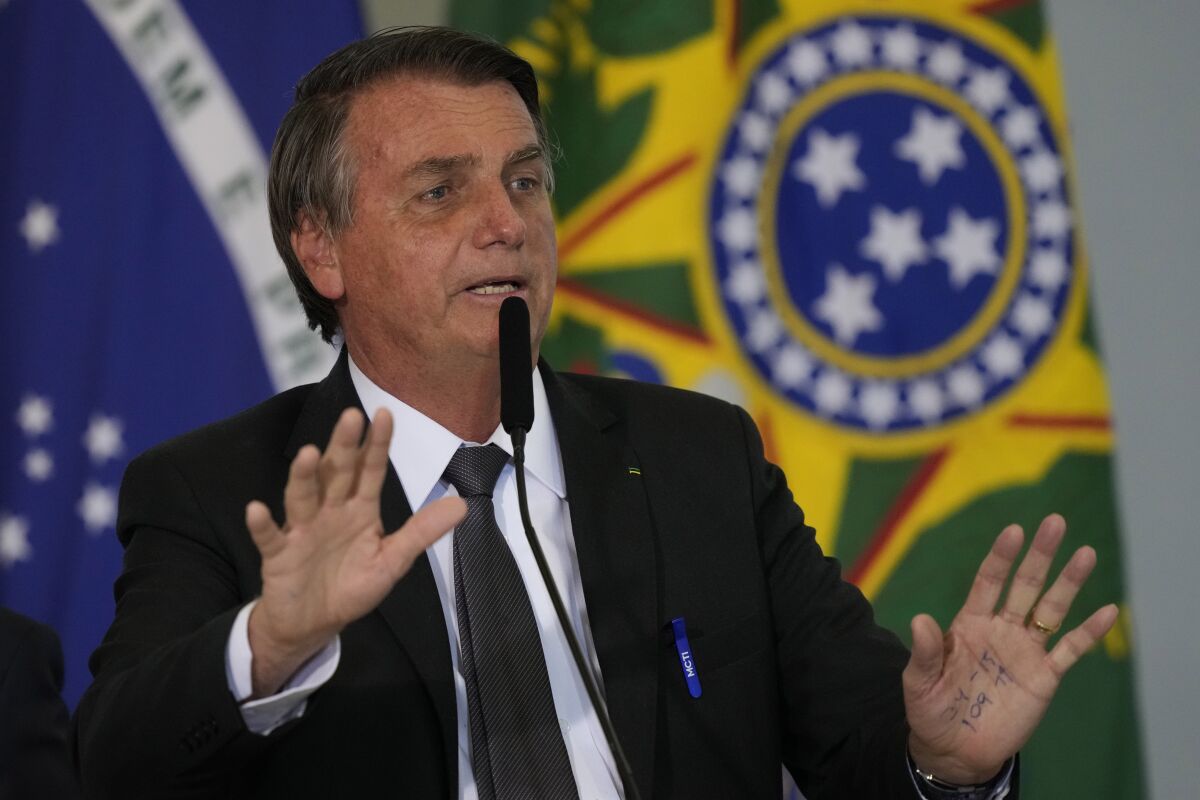Brazil's Electoral Court Rejects Bolsonaro Election Challenge
Brazil's electoral court rejects Bolsonaro election challenge to throw out some ballots from this year's presidential election. He said that Jair Bolsonaro's claim that some voting machines had broken down was “ludicrous and illicit” and “ostensibly conspiratorial toward the democratic rule of law.”
Author:Dexter CookeReviewer:Hajra ShannonNov 24, 20222.9K Shares266K Views

Brazil's electoral court rejects Bolsonaro election challengeto throw out some ballots from this year's presidential election. He said that Jair Bolsonaro's claim that some voting machines had broken down was “ludicrous and illicit” and “ostensibly conspiratorial toward the democratic rule of law.”
In his ruling, Chief Justice of the Supreme Electoral Court Alexandre De Moraes said that all models of electronic ballots were “perfectly identifiable in a clear, secure and integral way.” He also said that Bolsonaro's right-wing Liberal Party had to pay a $4 million fine for "bad faith litigation."
Moraes also said that the challenge was "offensive" to democratic values and that it was meant to help criminal and anti-democratic groups.
"The ballot boxes generate files that make it possible to identify precisely which equipment they were generated on. When one of these mechanisms stops working, others replace it, without affecting its traceability and the possibility of identifying ballot boxes," according to the decision.
Luiz Inacio Lula da Silva, also known as "Lula," a leftist candidate, beat Bolsonaro in a run-off vote last month. Lula will be sworn in as president on January 1.
Since then, Bolsonaro hasn't come out and said that he lost, but he has said that he will "continue to fulfill all commandments of the constitution." This has led people to think that he will help with the transfer of power.
But in the petition that Bolsonaro and the leader of his Liberal Party filed on Tuesday, they said that some voting machines had broken down and that any votes cast on those machines should be thrown out.
The complaint said that Bolsonaro would win if those votes were taken away, based on a study done by a company hired by Bolsonaro's party.
Election officials have said in the past that the same voting machines were used in both the first round of voting and the second round.
Valdemar Costa Neto, a congressman from the Liberal Party, said at a news conference on Wednesday that Bolsonaro's party only asked for verification of the second round because it would be impossible to do so in the first round because so many candidates would be affected.
Brazil has been dealing with high inflation, slow growth, and rising poverty, all of which have made the political climate there tense and divided.
Lula da Silva got more than 60 million votes, which is the most in Brazilian history and more than he got in 2006. He beat his own record from 2006.
Conclusion
Election experts and political analysts slammed Bolsonaro's supporters' challenge to the election results as weak, but it could still rile up his supporters who have been protesting his loss at the polls.
Jump to

Dexter Cooke
Author
Dexter Cooke is an economist, marketing strategist, and orthopedic surgeon with over 20 years of experience crafting compelling narratives that resonate worldwide.
He holds a Journalism degree from Columbia University, an Economics background from Yale University, and a medical degree with a postdoctoral fellowship in orthopedic medicine from the Medical University of South Carolina.
Dexter’s insights into media, economics, and marketing shine through his prolific contributions to respected publications and advisory roles for influential organizations.
As an orthopedic surgeon specializing in minimally invasive knee replacement surgery and laparoscopic procedures, Dexter prioritizes patient care above all.
Outside his professional pursuits, Dexter enjoys collecting vintage watches, studying ancient civilizations, learning about astronomy, and participating in charity runs.

Hajra Shannon
Reviewer
Hajra Shannona is a highly experienced journalist with over 9 years of expertise in news writing, investigative reporting, and political analysis.
She holds a Bachelor's degree in Journalism from Columbia University and has contributed to reputable publications focusing on global affairs, human rights, and environmental sustainability.
Hajra's authoritative voice and trustworthy reporting reflect her commitment to delivering insightful news content.
Beyond journalism, she enjoys exploring new cultures through travel and pursuing outdoor photography
Latest Articles
Popular Articles